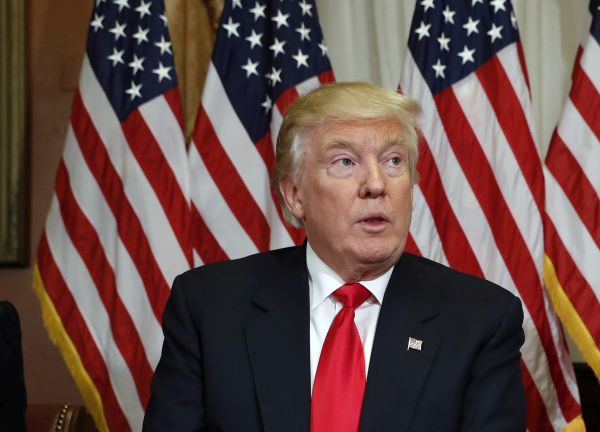 The president's move couldhave ripple effects in the Nov. 6 congressional elections formembers of his party in competitive House districts with largenumbers of federal employees. (AP Photo/Alex Brandon)
The president's move couldhave ripple effects in the Nov. 6 congressional elections formembers of his party in competitive House districts with largenumbers of federal employees. (AP Photo/Alex Brandon)
President Donald Trump canceled automatic pay raises forcivilian federal workers in 2019 as Congresscontinues to negotiate on salary increases.
|Trump made the announcement in a letter released by the WhiteHouse on Thursday to House Speaker Paul Ryan and Senate MajorityLeader Mitch McConnell. Trump cited the need to “maintain effortsto put our Nation on a sustainable fiscal course.”
|Related: Federal workers fear Trump COLA elimination inretirement
|Congress can still raise federal workers' pay in spendinglegislation. The Senate has already approved a 1.9 percent payincrease for next year but the House would still need to approveit. The House version of the legislation doesn't include a raise.The two bills must now be reconciled.
|Trump had asked for a pay freeze in his budget proposal thisyear, and his action conforms to that position.
|The president's move could have ripple effects in the Nov. 6 congressionalelections for members of his party in competitive House districtswith large numbers of federal employees. Just south of Washington,those areas include Representative Barbara Comstock in northernVirginia and Representative Scott Taylor in Virginia Beach.
|Had Trump not acted by Friday, federal workers would havereceived an automatic across-the-board pay increase of 2.1 percentand locality pay increases averaging 25.7 percent under the 1990Federal Employees Pay Comparability Act, according to theletter.
|No president including Democrats Bill Clinton and Barack Obamahave let the full locality pay increases take effect under thelaw.
|Last year, Trump lowered an automatic 1.9 percentacross-the-board increase under the law to 1.4 percent and anautomatic 26.2 percent average increase in locality pay to a 0.5percent average increase.
|Despite the expanding economy and Republican control ofCongress, the federal government is on track to rack up annualdeficits in excess of $1 trillion in the coming years following atax overhaul passed last year.
|J. David Cox, national president of the American Federation ofGovernment Employees, the largest union representing federalworkers, blasted Trump's pay freeze and urged the House to pass the1.9 percent pay increase approved by the Senate.
|“President Trump's plan to freeze wages for these patrioticworkers next year ignores the fact that they are worse off todayfinancially than they were at the start of the decade,” Cox said ina statement. “Federal employees have had their pay and benefits cutby over $200 billion since 2011, and they are earning nearly 5percent less today than they did at the start of the decade.”
|Democrat Gerry Connolly, who represents thousands of federalworkers in his northern Virginia district, also criticized Trump'sdecision.
|“His tax bill exploded the deficit, and now he is trying tobalance the budget on the backs of federal workers,” Connolly saidin a statement. “I will not accept President Trump's mismanagementof the federal government as fait accompli.”
|The White House didn't immediately respond to questions.
|Copyright 2018 Bloomberg. All rightsreserved. This material may not be published, broadcast, rewritten,or redistributed.
Complete your profile to continue reading and get FREE access to BenefitsPRO, part of your ALM digital membership.
Your access to unlimited BenefitsPRO content isn’t changing.
Once you are an ALM digital member, you’ll receive:
- Critical BenefitsPRO information including cutting edge post-reform success strategies, access to educational webcasts and videos, resources from industry leaders, and informative Newsletters.
- Exclusive discounts on ALM, BenefitsPRO magazine and BenefitsPRO.com events
- Access to other award-winning ALM websites including ThinkAdvisor.com and Law.com
Already have an account? Sign In
© 2024 ALM Global, LLC, All Rights Reserved. Request academic re-use from www.copyright.com. All other uses, submit a request to [email protected]. For more information visit Asset & Logo Licensing.








